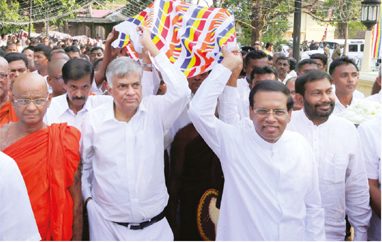THE NATIONAL UNITY GOVERNMENT
At present, public attention is focussed on governmental failure amidst a sense that nothing is happening in terms of changes on the ground – especially with regard to economic development that directly impacts the lives of the majority of citizens.
In assessing the government’s performance, it is important to have a wider focus on actions to improve the people’s quality of life, human rights protection and systems of good governance. This is the more holistic approach taken by the international community of which Sri Lanka is a constituent part.
TIME TO CLOSE THE EXPECTATION GAP
Dr. Jehan Perera is reassured by reported rapprochement in the state of play
Following the third meeting of the Working Group on Governance, Rule of Law and Human Rights under the European Union Sri Lanka Joint Commission in Colombo, the EU commended the government for its progress in protecting and enhancing human rights.
The EU noted that many important measures have been taken including the operationalisation of the Office on Missing Persons, ratification of the Optional Protocol to the Convention against Torture and passing of the Right to Information Bill. It also cited key ongoing reforms such as the replacement of the Prevention of Terrorism Act and reform of the Code of Criminal Procedure Act to bring them in line with global standards, and the status of the constitution.
Ironically, most of the positive developments noted by the EU are featured in the political debate within present-day Sri Lanka in a negative light. The ultra-negative aspects such as bribe taking and political infighting in the coalition government are receiving full attention in the media, and on political and intellectual platforms.
While the political scandals and rivalries within the alliance are being reported and commented on in great detail, the passage of fresh laws and formation of new institutions that will bring about changes in the political culture in the longer term are not being adequately communicated to the general public.
The new laws and institutions that the EU has noted, which have the potential to transform the lives of the citizenry in the years to come, are the result of the alliance between the United National Party (UNP) and Sri Lanka Freedom Party (SLFP), which are led by Prime Minister Ranil Wickremesinghe and President Maithripala Sirisena respectively.
They have used the two-thirds majority in parliament made possible by their alliance to pass the landmark 19th Amendment as well as several important laws. The fullest credit must be given to the president and prime minister who have steered the country to achieve these goals that have earned the praise of the international community, and won support and access to markets.
Each of these laws has been advocated for decades by civil society and human rights activists as being essential for good governance in the country. And they have come to fruition during the tenure of the national unity government.
However, they are yet to be implemented on the ground by the government and remain in the air as simply laws that have been passed. Examples would be laws that have strengthened independent institutions such as the Bribery Commission and police but have yet to tackle the problems they’re mandated to address.
Many are frustrated by infighting within the government, and its failure to take decisive action on promises regarding anticorruption and economic prosperity. They may believe that an end to the UNP-SLFP alliance is the way forward for Sri Lanka. It was in this context that a venerable prelate affirmed the need for a ‘Hitler’ to take possible decisive action.
But such a break in relations, if it takes place, could take the country on a path of instability and uncertainty. Therefore, it is necessary to appreciate and commend the national unity government, for its peaceful and nonviolent achievements that have been noted by the EU, and to use those achievements for reconciliation in and outside government.
If the changes anticipated and promised in 2015 are to materialise, the parties in the government must work together and speak in one voice so that the people hear a unified message. When the government coveys different and often contradictory messages, it creates an impression of an incoherent state.
There is rapprochement reportedly taking place between the UNP and SLFP, and the president and PM. Their points of agreement are said to be fast tracking development plans and fulfilling pledges made to the people during the January 2015 presidential election.
It is important that these changes take place on the ground.






